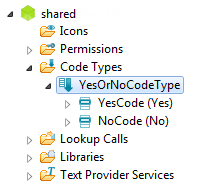Notice: this Wiki will be going read only early in 2024 and edits will no longer be possible. Please see: https://gitlab.eclipse.org/eclipsefdn/helpdesk/-/wikis/Wiki-shutdown-plan for the plan.
Difference between revisions of "Scout/Concepts/CodeType/Example"
m (Category changed) |
(→Code) |
||
| Line 22: | Line 22: | ||
@Override | @Override | ||
protected String getConfiguredText() { | protected String getConfiguredText() { | ||
| − | return | + | return TEXTS.get("YesOrNo"); |
} | } | ||
| Line 37: | Line 37: | ||
@Override | @Override | ||
protected String getConfiguredText() { | protected String getConfiguredText() { | ||
| − | return | + | return TEXTS.get("Yes"); |
} | } | ||
| Line 53: | Line 53: | ||
@Override | @Override | ||
protected String getConfiguredText() { | protected String getConfiguredText() { | ||
| − | return | + | return TEXTS.get("No"); |
} | } | ||
Revision as of 03:28, 15 April 2013
The Scout documentation has been moved to https://eclipsescout.github.io/.
This page contains some example Java code for a simple The Scout documentation has been moved to https://eclipsescout.github.io/. having just two The Scout documentation has been moved to https://eclipsescout.github.io/.:
-
YesOrNoCodeType.YesCode -
YesOrNoCodeType.NoCode
Notice that the CodeType Id is a String and that both code have an Boolean Id.
The definition of codes is reduced to an Id and a Text, but we could also imagine to configure the IconId or the Tooltip.
Code
public class YesOrNoCodeType extends AbstractCodeType<String> { private static final long serialVersionUID = 1L; public static final String ID = "YesOrNo"; public YesOrNoCodeType() throws ProcessingException { super(); } @Override protected String getConfiguredText() { return TEXTS.get("YesOrNo"); } @Override public String getId() { return ID; } @Order(10.0) public class YesCode extends AbstractCode<Boolean> { private static final long serialVersionUID = 1L; public final Boolean ID = Boolean.TRUE; @Override protected String getConfiguredText() { return TEXTS.get("Yes"); } @Override public Boolean getId() { return ID; } } @Order(20.0) public class NoCode extends AbstractCode<Boolean> { private static final long serialVersionUID = 1L; public final Boolean ID = Boolean.FALSE; @Override protected String getConfiguredText() { return TEXTS.get("No"); } @Override public Boolean getId() { return ID; } } }
Usage
This code Type can be used in a The Scout documentation has been moved to https://eclipsescout.github.io/. extending AbstractSmartField<Boolean>
public class YesOrNoSmartField extends AbstractSmartField<Boolean> { // other configuration of properties. @Override protected Class<? extends ICodeType<?>> getConfiguredCodeType(){ return YesOrNoCodeType.class; } }
In the SDK
The Scout documentation has been moved to https://eclipsescout.github.io/. proposes a graphical representation of this CodeType. It is possible to modify the corresponding Java code directly in the SDK.

